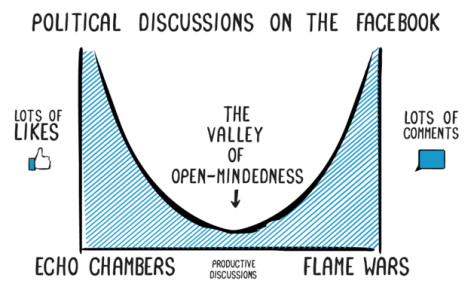The social media “echo chamber” is real

Tags: Facebook
The social media “echo chamber” is real published by nherting
Writer Rating: 5.0000
Posted on 2017-03-16
Writer Description: current events
This writer has written 195 articles.
By making so much information so accessible, social media has drastically changed the way we consume information and form opinions in the modern era. The danger, however, is that social media creates an “echo chamber” that filters the information people receive so that it largely supports their existing opinions.
A recent study published in PNAS examines this phenomenon and finds that social-media users show marked focus in the types of news that interests them. These social-media participants tend to develop strong and well-defined communities around the news outlets they support, and they tend to make connections with like-minded people regardless of the geographic distance between them.
The PNAS study looked at the Facebook activity of a whopping 376 million English-speaking users. Its authors examined how these people interacted with English-speaking news sources on the platform in terms of their consumption of news, as well as their connectivity in terms of sharing, liking, and commenting on news-related items.
The authors found that Facebook users typically interact with a small number of news outlets. Users tend to confine their activity to a limited set of pages. These behaviors allow news consumption on Facebook to be dominated by selective exposure, meaning that people are most often exposed to news sources that reinforce their existing opinions. Though social media critics have been making this claim for a while, the authors’ quantification of this behavior adds strong empirical evidence to the argument.
In terms of this behavior, Facebook users’ interactions with news sources largely depend on their online communities. This is where users tend to gather based on common beliefs and interests. After quantifying the fraction of user activity in the largest communities and a sampling of smaller ones, the authors found that people are significantly more likely to interact with their largest Facebook community.
The authors saw that active Facebook users were more likely to interact with a limited number of news sources. Additionally, the more active a community was, the more self-segregated and polarized it was.
However, the authors did see some different results when they used other definitions for online “community.” One definition included communities that were established by Facebook “page creators,” such as a local church, community center, or school. These types of communities tended to be made up of users who were closely linked geographically. By contrast, when the researchers looked at communities that were defined by users’ activity (such as likes, reactions, and shares), the communities were geographically larger and tended to be international. Though these different definitions of community changed the geographic distribution of users, all of them still trended toward self-segregation and polarization of news consumption.
Google and Facebook are trying automated solutions to prevent the spread of fake news via social media. However, coming up with good solutions will be challenging, because the larger underlying problem is that social media allows users to self-segregate. Existing social-media algorithms feed users news sources that they have previously shown interest in. Over time, this narrows the news sources of Facebook users and tends to expose them to information that reinforces their own perspectives. So they become increasingly polarized.
Since we’ve become so attached to social media, we are less and less required to interact with people who disagree with us. Technology allows us to reach across state lines (and even oceans) to find people who share our beliefs and values. Until social media designers can address the fact that these platforms allow the increasing polarization of users into small, tight-knit communities, stopping the proliferation of misinformation will continue to be a challenge.
Sources: https://arstechnica.com/science/2017/03/the-social-media-echo-chamber-is-real/
You have the right to stay anonymous in your comments, share at your own discretion.


